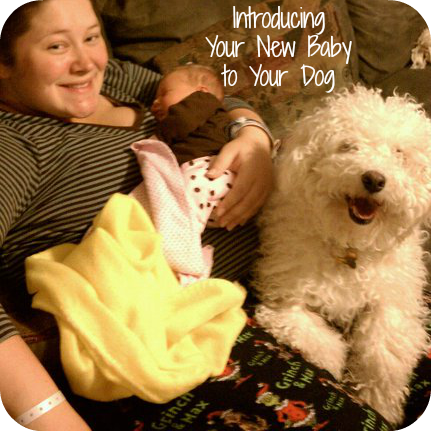When I was pregnant with my first child, one of my biggest worries was how our beloved dog would handle the transition. Would he be jealous? Would he feel neglected or, worse, act out? These concerns kept me up at night. The good news is, with a little preparation and thoughtful planning, the transition from “only fur-child” to “big furry sibling” can go surprisingly well.
I’m not a dog trainer or a behaviorist, but I am a mom who’s been through it and these are the practical steps that worked for our family. Every dog is different, so your results may vary, but I hope our experience offers some guidance and reassurance.

1. Desensitize Your Dog to Baby Sounds
To prepare him, I played videos of crying babies from YouTube every evening for a couple of weeks leading up to our due date. At first, he was confused, even a little agitated. But over time, he became less reactive. When we finally brought our daughter home, he didn’t bark or panic when she cried—he calmly came to alert me instead. It was sweet, and I credit that simple sound training for setting the stage for a calm introduction.
Tip: Play baby sounds at a low volume at first, gradually increasing it over time. Praise your dog for calm behavior and offer treats to create a positive association.
2. Let Your Dog Smell Baby’s Scent in Advance
Dogs process the world through scent, so introducing your baby this way helps bridge the gap between the unknown and the familiar. When we finally walked through the door with our newborn, our dog wasn’t overly excited or invasive. He had already “met” her through her scent.
Tip: Rub the blanket over the baby’s head and neck (where scent is strongest) and allow your dog to sniff it calmly. Avoid forcing the interaction—let your dog approach the blanket on their own terms.
3. Let the Primary Caregiver Handle the Introduction
I sat down on the couch with our baby in my arms and let our dog come to us. I spoke softly, moved slowly, and allowed him to sniff her feet first making sure to avoid her face and hands. His tail wagged, and he sat next to us contentedly. I’ll never forget that moment.
Tip: Don’t force the interaction. Let your dog explore at their own pace while you remain calm and reassuring.
4. Understand Your Dog’s Temperament
Preparation should begin well before your due date. Talk to your vet or a certified dog trainer about specific behaviors you’d like to reinforce or redirect before the baby comes.
Tip: Start working on commands like “leave it,” “go to your bed,” and “gentle” months in advance to establish control and trust.
5. Set Boundaries Early
We started this practice a few weeks before her arrival, so it wasn’t a shock to him after she was born. It helped set a clear expectation while reinforcing that his role in the family was still important—just different now.
Tip: Use baby gates or closed doors to set physical boundaries and reward your dog for respecting them.
6. Don’t Forget to Show Your Dog Some Love
Tip: Try walking your dog with the baby in a stroller. It gives your dog a sense of inclusion and reinforces the idea that this new little human is part of their pack.
Final Thoughts
Remember: you know your dog best. Trust your instincts, stay calm, and don’t be afraid to ask for help if you need it.
Have you introduced a new baby to your fur baby? What worked for you? Share your tips in the comments. I’d love to hear from you!




.png)



We don't have any pets but this is some good information to those that do have dogs. =)
ReplyDeleteWhat a great idea for a post and good suggestions! We never had to deal with this as our dog at the time was outdoors only, but this seems like something that would be easily overlooked with new parents with all of the other worries and preparing they're doing. :)
ReplyDeleteGreat tips!! We are lucky that Mojo is amazing with our little man :)
ReplyDeleteWe did not have any dogs in the house when we had babies but did have a cat that started peeing on everything...
ReplyDeleteWe gradually introduced out cats to our daughter when we brought her home, and again when we brought home our son.
ReplyDeleteGreat advice! Thank you so much!
ReplyDelete-Jenny from saferkids.com
This is excellent advice! So often the dog in the family gets sort of forgotten when a baby arrives (which is understandable with all the care a baby demands!). I would also suggest that when the baby is around the dog gets a special treat - that might help him associate the baby with good things.
ReplyDeleteGreat tip!
DeleteWe never had a dog to worry about, just my oldest cat who was the 1st "kid". It took quite a while, but he warmed up eventually.
ReplyDelete